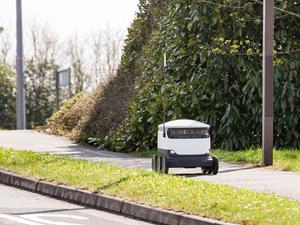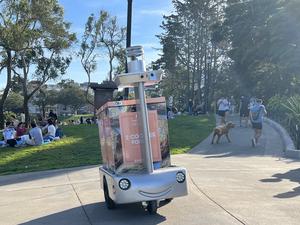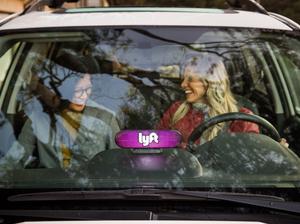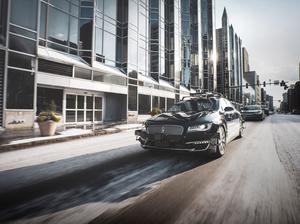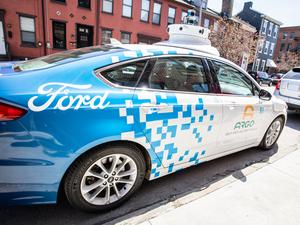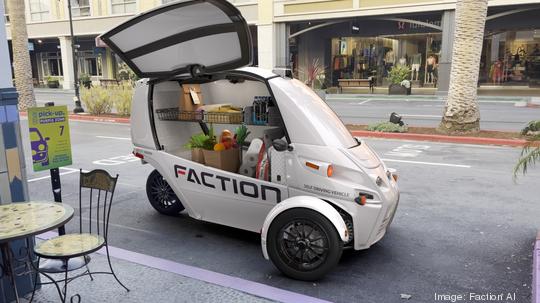
What if a fully autonomous future where cars zoom around streets without drivers or human interaction is not only unattainable but also unnecessary?
A South San Francisco startup is developing a driverless system in which artificial intelligence and remote operators work behind the scenes to take humans out of the driver's seat — and it already has driverless vehicles making deliveries in the Bay Area.
The company's Level 2 autonomous driving system means it has some automated features but is not fully autonomous, requiring active monitoring and intervention by a human driver at all times. Faction AI's teleoperators actively monitor the company's electric three-wheel vehicles and intervene only when necessary.
The company, founded in 2020 by Ain McKendrick, has raised more than $6 million in seed funding. Its investors include Y Combinator, Side Door Ventures, Kube VC, TDK Ventures, Uncorrelated Ventures, Fifty Years, Soma Capital and Trucks Venture Capital, according to PitchBook.
McKendrick has worked in consumer electronics and services for a few decades. He was a software engineer at Palm Computing in the 1990s and went on to work at TiVo, Dell, Netflix and Starsky Robotics, an autonomous trucking company based in San Francisco that shut down in early 2020.

While Faction deploys its own vehicles, eventually McKendrick sees the company building out an operating system that can be licensed to other vehicle manufacturers as cars begin to "look a lot more like smartphones or consumer electronics devices," he said.
"It's a hardware-software-service combination. You've got over-the-air software updates. Software upgradability. Everything is defined by the software,” he told me. “You'll hear a lot of people in the automotive industry talking that they want to do this eventually, but I'd say the DNA for doing that is only found in certain areas, certain types of industries. This is an interesting inflection point right now where it's an opportunity to do for the vehicle space what smartphones did for mobile phones."
The company commenced a soft launch this summer in San Mateo with Cocola, a bakery that specializes in cupcakes. As it expands its service area, Faction will focus on building partnerships with small- and medium-sized businesses to get orders delivered to customers.
In the long run, McKendrick wants to expand to more types of uses, such as mid-day restocking deliveries to restaurants, auto repair shops and commissary kitchens. One day he envisions being able to handle medical deliveries such as organs, but the vehicles are not now refrigerated or certified for hazmat situations.
He also sees gig labor-powered delivery services like DoorDash both as a potential future partner.
"We're open to any company that would like to join us right now for the pilots, long-term for us, we want to partner," McKendrick said. "I'm not looking to compete head-to-head with DoorDash or Gopuff or Instacart. We want to partner with them."
The company charges $9.95 for deliveries that run up to six miles or $23.95 for up to 20 miles.
Faction also partners with GoCar in a limited pilot that can remotely deliver car rentals from inventory depots to hotels, but the cars are not fully autonomous and customers still have to get behind the wheel.
"Robotaxi is a terrible business. We don't want to go anywhere near it," McKendrick said. "The goal is to start with the consistent stuff that you can run on a regular basis."
Faction AI's three-wheelers are manufactured by two companies: Eugene, Oregon-based Arcimoto and British Columbia-based Electra Meccanica. They are regulated as motorcycles in California.
The company currently has a dozen vehicles in its fleet. Each one costs between $30,000 and $35,000 after Faction adds cameras and radar, machine learning for lane detection and thermal cameras to identify humans and other vehicles even during difficult weather conditions like fog and bright sun.
"And that's how you actually have a competitive system that can actually perform at $2 a mile and be profitable," McKendrick said.
Last year, Cruise CEO Dan Ammann told investors that the company is trying to lower the cost per mile of its own fleet from around $5 to $1.50, according to CNBC. Other cost estimates vary but the industry standard could eventually drop below $1 per mile, according to the Department of Transportation.
Other companies are approaching the autonomous deliveries with much smaller robotic pods.
S.F.-based Starship Technologies has developed six-wheeled capsules that can deliver up to four standard grocery bags-worth of food and offers deliveries primarily on select university campuses around the U.S. and Europe, though it cut some markets and laid off staff this year.
And in December, Uber launched its own robotic delivery service in Miami in partnership with Oakland-based robotics startup Cartken.
The California DMV regulates vehicles with Level 3 and Level 4 autonomous software, effectively leaving Faction's technology out of its purview.
Only three companies are permitted to commercially deploy their vehicles in the state without a driver, according to the DMV: Cruise, Waymo and Nuro. They're also among seven companies that have permits for driverless testing alongside Amazon-owned Zoox.
Tesla, Apple, Intel, Nvidia, Nissan, Pony.ai, Aurora and Didi are among the more the 40 companies allowed to test with a driver.
Uber and Lyft both maintained in-house autonomous car divisions but offloaded them over the past couple of years. After years of claiming that autonomy was a crucial part of their plans for profitability, the costly endeavors were a drag on their bottom lines.
And Ford-backed Argo AI also recently shut down due to slow progress and high costs.
